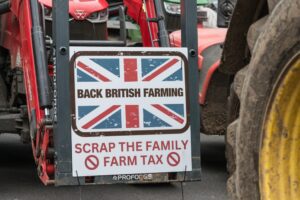A group of farmers and family business owners is challenging the government’s controversial inheritance tax reform in court, claiming ministers failed to properly consult before announcing sweeping changes in the Autumn Budget.
The legal claim, served on Tuesday to Chancellor Rachel Reeves and HMRC, calls for a judicial review of the government’s decision to cap long-standing tax reliefs for farmland and family businesses without a full public consultation.
The challenge targets changes to Agricultural Property Relief (APR) and Business Property Relief (BPR) — two key tax exemptions that have, for decades, allowed farms and small businesses to pass down assets without incurring inheritance tax. Under new rules set to come into force in April 2026, the combined value of assets protected by the reliefs will be capped at £1 million, a move ministers say is necessary to tackle tax avoidance among the ultra-wealthy.
The claimants, represented by law firm Collyer Bristow, argue that the government has a legal obligation to conduct proper consultation on significant tax changes — something they say was denied to the sectors most affected.
“This claim does not seek to overturn the government’s decision to amend APR or BPR,” said James Austen, a partner at Collyer Bristow. “It simply asks that affected individuals and groups can contribute to a proper consultation process to ensure the government has the best possible evidence when developing tax policy for UK farms and businesses.”
The inheritance tax shake-up has sparked uproar among farmers, who have dubbed the reforms a “family farm tax”, warning it could jeopardise generational handovers and force the sale of farmland to cover tax bills.
Family Business UK, which represents family-run firms, has also condemned the move. It estimates the changes could put 200,000 jobs at risk, as small and medium-sized businesses divert cash from investment to meet looming liabilities.
Rachel Reeves has defended the changes as a fair and necessary modernisation of the tax system, claiming that the reliefs were being exploited by wealthy landowners and investors to sidestep inheritance tax altogether. The Treasury insists that the majority of ordinary farms and businesses will still be protected by existing exemptions — such as spousal relief and the ability to pay tax bills in instalments over a decade.
However, critics argue that the government’s limited engagement with the sectors affected — restricted to a narrow technical feedback process — falls short of proper consultation.
The judicial review request says the decision to bypass a full consultation “risks flawed legislation” and could undermine the long-term viability of farming and family enterprises.
The legal action follows a similar challenge over the imposition of VAT on private school fees, which was dismissed earlier this month. While the High Court acknowledged the policy could infringe some students’ rights, it found these were outweighed by the wider public benefit of increased state school funding.
While the judicial review does not seek to overturn the tax changes outright, it adds to growing pressure on the Treasury to revisit how it engages with key sectors on major tax reforms.
Industry leaders argue that poor consultation risks undermining trust in the government’s policymaking process — and could ultimately damage vital parts of the UK economy.
The Treasury did not immediately respond to a request for comment.
Read more:
Farmers seek judicial review over inheritance tax clampdown

